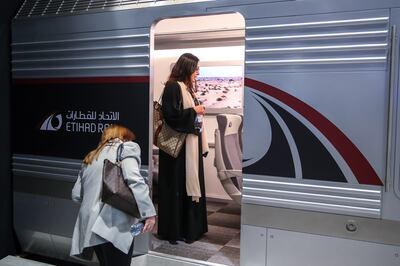Saudi Arabia's public transport chief has set out a vision for a “smooth, liveable” Riyadh powered by a six-line metro that is earmarked for expansion before it has even opened.
Khalid Alhogail, the general manager of Saudi Arabia Public Transport Company, told The National that the under-construction metro was “in a race” to keep up with population growth.
He said the growth of public transport in the Middle East and North Africa showed the world what can be achieved even in a hot, car-heavy region.
Metros and light rail networks in Dubai, Doha, Cairo and Casablanca have helped put the region on the public transport map. The UAE’s Etihad Rail project formally opened for freight in February and plans to soon carry passengers as well.
Operators have used a summit of the International Public Transport Association in Barcelona this week to show off low-emission Gulf transport plans and innovations to the world.
Mr Alhogail, the association’s departing president, said the rise of transport “gigaprojects” in the region had been 15 years in the making, after the Middle East once turned to more established operators for expertise.
Speaking on the penultimate day of his two-year term, he said traffic congestion and the Covid-19 pandemic had also spurred the rise of alternatives such as walking, cycling and scooters.
“Today we have become a reference point for the other nations who are now growing their cities and developing their transportation, to see a very good example that has been executed in our region,” he said.
“Having low-cost fuel, having more challenging weather doesn’t enhance public transport. But we did it.”

The use of public transport in Dubai has trebled as a share of all journeys since 2006, the summit was told, with plans also under way for a flying taxi system and a zero-emission fleet of buses.
Riyadh’s buses account for only a small share of trips in the Saudi capital but the picture will change when the city opens its six-line, 176km metro system.
The metro will be connected to an expanded bus network and is expected to open by 2024, with Mr Alhogail also keen to offer better walking and cycling options.
He said officials were already exploring the possibility of extending some of the metro lines before they have even opened, as Riyadh’s population of 7.5 million is forecast to hit 15 to 20 million by 2030.
“We are in a race with the expansion of the city in all directions,” he said. “To make it happen in a smooth, liveable city [means] providing the best network that saves people time and makes the city enjoyable.
“Having the best network of vehicles, best buses, best trains, best technology – this will attract them and push them from private to public.”
Qatar’s 76km metro opened in time for the football World Cup last year. The Casablanca tram started running in Morocco in 2012 and two new lines are scheduled to open next year.
A 110km Bahrain metro is also in the works and there are similar proposals in Kuwait and Oman.

The UAE’s Etihad Rail signed an agreement with Uber last month as it looks to build on its initial freight haulage with a passenger link between 11 cities and areas, including a 50-minute between Dubai and Abu Dhabi.
Dubai is advertising its net-zero transport push as it prepares to host the Cop28 climate summit at Expo City in November.
Mohamed Mezghani, the global transport body’s secretary general, lauded Dubai and the wider region for being a model for other countries.
Although cities in the Middle East “in most cases were designed for cars, they realise that public transport could boost the city”, he said.
Mr Alhogail is stepping down as the body's president on the expiry of his two-year term. His successor will be Ottawa transport chief Renee Amilcar.






















